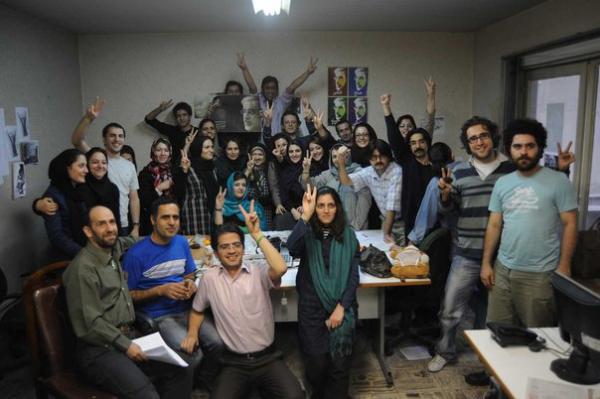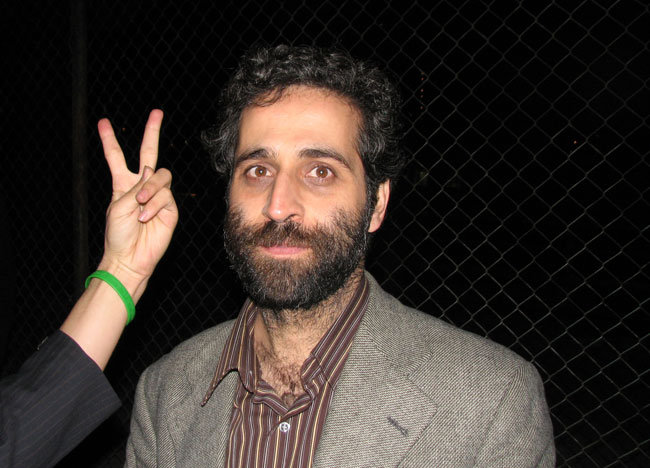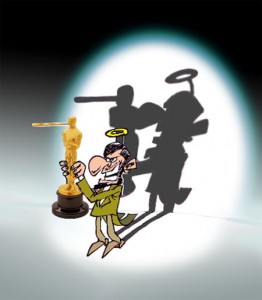
2135 GMT: Rumour of Day.
Kalameh alleges that prisoners held in cellblock 209 of Evin Prison
have been commanded to fill in forms about their views on election fraud and whether the protest leaders are connected to foreign countries.
2100 GMT: Dr Mohammad Maleki, the former head of Tehran University,
has reportedly been released after 191 days in detention. Maleki, 76, suffers from prostate cancer.
Iran: Understanding the Assembly of Experts Statement “Crisis Continues”
Iran Document: Mousavi’s Interview “Reform Within the Current Framework” (27 February)
The Latest from Iran (28 February): What Do The Statements Mean?
2055 GMT: United4Iran has
a profile of Jahanbakhsh Khanjani, former advisor to Iran’s Minister of Interior in the Khatami Presidency, who was released on 24 February after spending more than eight months in prison. According to another released prisoner, Khanjani was under pressure to confess and was constantly moved from general confinement to solidarity confinement.
2030 GMT: 2nd Picture of the Day (see 1540 GMT). The staff of
Etemaad newspaper just after its suspension (1455 GMT) by Iranian authorities: "Victory".

1935 GMT: Faoud Sadeghi, the managing director of
Ayande News, has
reportedly been released.
Journalist Mahsa Jazini ha
s been freed on $100,000 bail in Isfehan.
1930 GMT: Khatami Stands Firm. Back from an academic break to find a statement from former President Mohammad Khatami, responding to the Supreme Leader's declaration that opposition figures had put themselves beyond the Iranian system with their post-election challenge.
He said in a meeting with students:
It is easy to create tensions in the world, but difficult to eliminate them. Detente requires courage and finesse, and the system has to take steps to that effect. We should not embark on adventurism in the world under pretext of having won so many enemies. We should hold back from speaking in a manner to inflict heavy costs....
Everyone may have had his own interpretation of reforms, but we mean reforms within the framework of criteria born out of Islam, the revolution and the nation's will. In the face of any possible deviation from Islam and Imam Khomeini's line, we have to give warning....
Go and ask the former revolutionary militants if the ongoing conditions reflect what they were after. Ask them if these arrests, blame games, vendettas and the imposition of costs on the nation were what the revolutionary forces sought. If not, our conscience necessitates that we close ranks in order to improve conditions....
We should not retreat from our demands, and we should keep fighting even if certain groups beat us on the head. Unfortunately, certain hard-line groups in the society are opposed to any compromise within the society.
1615 GMT: Really. Not-Very-Much-News. Iran's Foreign Minister Manouchehr Mottaki
has denied, amidst the fuss over the International Atomic Energy Agency report on Tehran's nuclear programme, that there is any problem:
The new chief and the new managers of the agency should look at the record of Iran's cooperation. We have fully cooperated with the agency. This cooperation will continue. We have always welcomed and encouraged negotiations and talks.
1555 GMT: Rigi Mystery. This story isn't over....
Kyrgyzstan’s foreign ministry
has issued a statement saying that Iran has officially apologised for forcing a Kyrgyz plane to land in Iran. More significantly, the foreign ministry has denied that any passengers were taken off the plane, including Jundullah leader Abdolmalek Rigi, by the Iranians: “According to information available to this ministry, media reports that s two foreigners were arrested in this fight are untrue."
Now, is Kyrgyzstan making the denial to save face and cover up that Rigi was lifted from one of its flights? Or is it the case that the Jundullah leader was never on that plane?
1540 GMT: Picture of the Day. Abdolreza Tajik after his release from prison (see 0945 GMT):

1520 GMT: A Most Symbolic Visit. Seyyed Hassan Khomeini, the grandson of Ayatollah Khomeini,
has visited Ali Karroubi, the son of Mehdi Karroubi who was beaten on 22 Bahman.
1515 GMT: Cutting off Business. Caterpillar, the US building equipment group, has announced steps to
sever trading links with Iran. The company is barring its non-US subsidiaries from accepting orders for products that they know are destined for delivery to Iran.
1510 GMT: Not-Very-Much-News (from the Other Side). Press TV
gives the Iran version:
Iran has called on the UN nuclear watchdog to bear in mind the West's past breaches of atomic fuel exchange deals with Tehran while reviewing Iran's nuclear program.
In a letter to the UN body, Ali Asghar Soltanieh, Iran's envoy to the International Atomic Energy Agency (IAEA), cited three instances on which Western countries failed to meet their commitments and provide Iran with nuclear fuel.
In other words, Tehran will hold out against a "3rd-party enrichment" deal involving Germany, US, or French authorities because they cannot be trusted.
But (and excuse me for being repetitive)...no mention of Japan as unreliable.
1505 GMT: Stopping the Protests. Rah-e-Sabz claims that
20,000 people were detained during the rallies of 22 Bahman (11 February).
1455 GMT: Back to the (Banned) News. Fars reports that Iranian authorities
have banned the weekly magazine Iran Dokht, linked
with Mehdi Karroubi.
Etemaad has also been suspended.
1445 GMT: Not-Very-Much-News (cont.). Nothing --- yes, nothing --- new in the Amano report to the IAEA. It merely restates the long-standing finding, "[The IAEA] continues...to verify the non-diversion of declared nuclear material in Iran, but we cannot confirm that all nuclear material in Iran is in peaceful activities."
This, however, will not stop many in the media from declaring that something dramatic has occurred. The lead
from the Associated Press: "The chief of the U.N. nuclear watchdog agency says he cannot confirm that all of Iran's nuclear activities are peaceful."
Nor will it deflect some from overblown declarations and calls to global conflict. Jamsheed Choksy (apologies that you'll have to pay to get the full polemic)
in The Wall Street Journal: "Iran's New World Order --- Its nuclear program is part of a larger plan to radically reduce U.S. power."
1430 GMT: Today's Not-Very-Much-News. Back from an academic break to find the media buzzing over the International Atomic Energy Agency meeting, with
a report from new Secretary-General Yukiya Amano. The section on Iran:
I would like to inform you about the current situation concerning Iran’s request to the Agency for assistance in providing fuel for the Tehran Research Reactor, as I receive many questions in this regard.
In June 2009, the Agency received a request from Iran for assistance in obtaining fuel for the research reactor in Tehran, which produces isotopes for medical purposes. In October 2009, at a meeting with the Governments of Iran, France, the Russian Federation and the United States, the Agency made a proposal under which Iranian low enriched uranium (LEU) would be shipped to Russia for further enrichment and then to France for fabrication into fuel. Three of the four countries gave their consent to this proposal.
In a letter to the Agency dated 18 February, 2010, Iran said it continued to wish to buy the necessary nuclear fuel or, if this was not possible, to exchange some of its LEU for reactor fuel from abroad. Iran requested the IAEA to relay its request to potential suppliers and to facilitate the provision of the fuel. The Agency circulated Iran’s letter to Member States as requested.
The arrangement proposed by the Agency in October 2009 remains on the table. I believe it would ensure continued operation of the Tehran Research Reactor and serve as a confidence-building measure. At the same time, I am following up on Iran’s February 18 request, in accordance with the IAEA Statute, and have been in contact with the relevant countries....
Implementation of Safeguards in the Islamic Republic of Iran
You have received my report on Implementation of the NPT Safeguards Agreement and relevant provisions of Security Council Resolutions in the Islamic Republic of Iran. It is longer than previous reports because I wanted my first report to be a stand-alone document. I tried to make it factual, without overdoing the detail.
The Agency continues, under its Comprehensive Safeguards Agreement with Iran, to verify the non-diversion of declared nuclear material in Iran, but we cannot confirm that all nuclear material in Iran is in peaceful activities because Iran has not provided the Agency with the necessary cooperation.
The necessary cooperation includes, among other things, implementation of relevant resolutions of the IAEA Board of Governors and the United Nations Security Council, implementation of the Additional Protocol and of modified Code 3.1, as well as clarification of issues related to possible military dimensions to Iran’s nuclear programme.
I request Iran to take steps towards the full implementation of its Safeguards Agreement and its other obligations as a matter of high priority.
1200 GMT: Rafsanjani Watch. Faezeh Hashemi, the daughter of Hashemi Rafsanjani, has declared that
her father accepts no bargaining on people's rights and that the only way out of the crisis is to follow the suggestions in his Friday Prayer of 17 July. Replying to the question of why Rafsanjani has not taken the podium at Friday Prayers since then,
Hashemi said, “His main reason is not to cause harm to innocent people. In his last sermon, security and intelligence forces attacked protesters and arrested some of them.”
Hashemi, indirectly commenting on last week's Assembly of Experts meeting that Rafsanjani chaired, warned that extremists were trying to unseat Rafsanjani to achieve their goals.
1100 GMT: Claim of the Day.
Rah-e Sabz asserts that the head of Iran's judiciary, Sadegh Larijani, has said that the
Supreme Leader asked him to execute more protestors.
Larijani was reportedly confronted by his relatives and associates, including Mostafa Mohaghegh-Damad, the former head of the National Audit Office, who were unhappy with the executions of Arash Rahmanipour and Mohammad Reza Ali Zamani in late January. Larijani replied, “Go and thank God that I have lowered the number of executions.”
Larijani allegedly said that he had attended a meeting at the time including Khamenei. Ahmad Jannati (head of the Guardian Council), Mohammad Yazdi, and Mohammad Momen Qomi all invoked of the Sharia law demanding that the protesters and the "leaders of sedition" be executed.
Khamenei responded that, although this was their religious opinion, a large number of executions would cause political problems for the regime. He then turned to Larijani saying, “In all honesty we expected more than this [two executions].” Larijani later told associates, “I have tried very hard to keep the number of executions low, as my superiors had asked for more”.
1045 GMT: Following Up the Assembly. The political moves from last week's Assembly of Experts meeting continue, even beyond
Mr Verde's Sunday analysis. While the official statement --- once it finally appeared --- pledged loyalty to the Supreme Leader, there has been an overlooked postscript.
The Secretariat of the Assembly has published the report by the Assembly’s Investigation Committee into the
circumstances of the Supreme Leader and his fitness to remain in the post, under Article 111 of the Iranian Constitution). The report, dated 27 February, is signed by Mohsen Mojtahed-Shabestari (Assembly member, Khamenei's representative to East Azerbaijan, and Tabriz's Friday Prayer leader.
Although the report is similar to the Assembly's closing statement, the Green website
Rah-e-Sabz is celebrating the publication of this report as a victory for public pressure on the Assembly. For the first time, the Supreme Leader's fitness for his post is now a matter of public discussion.
1000 GMT: But You Could Just Watch the Nukes Instead. On the nuclear programme front, it looks like another day of media focus on the rhetorical battle between Iran and members of the International Atomic Energy Agency. The IAEA, with a new Director-General, begins a four-day discussion of the draft report on Iran's current uranium enrichment efforts, and the occasion has been preceded by a series of Iranian verbals attacks, including the Supreme Leader's denunciation of a US-controlled IAEA.
The Los Angeles Times, for example,
devotes a lengthy article to the political theatre: "[Iran has] dramatically shifted its public tone toward the United Nations' nuclear watchdog, dropping its previous deference while harshly criticizing the agency's latest report and its new director-general as an incompetent and biased lackey of the West."
Amidst the furour, few take any notice of Iran's more conciliatory position accepting Japan as a country for "third-party enrichment", signalled by Ali Larijani during his trip to Tokyo. And none, to my knowledge, consider the ripples of Larijani's changed position across the Iranian political waters.
0915 GMT: And so unfolds another week in a crisis which, according to the regime, was over. Mir Hossein Mousavi's interview continues to command attention and more than a few questions about strategy and prospects for the Green Movement. After initial doubts, I'm tilting towards a more optimistic reading. Because of the importance of the issue, the analysis is still being developed: we're hoping to have it out tomorrow.
Meanwhile, the regime --- which, again, has supposedly won this conflict --- continues to bluster. Basij Commander Mohammad Reza Naqdi, continuing
the Government's propaganda drive on the capture of Jundullah leader Abdolmalek Rigi, declared that President Obama would confess as quickly if he came to Iran:
This pure form of Islam [practiced in Iran] is such that it will even break our staunchest enemies. This thug [Rigi] was nothing, even if Obama himself, who Rigi has confessed to cooperating with, comes to Iran he will also confess to all his sins under the influence of this [pure form of] Islam.
The U.S. and other Western countries have reached a cultural, military, political and economic dead-end and the only weapon in their hands to bully other countries is technology and if we succeed in prying this tool away from them they will be finished.
Far more significant is the news of the regime's
freeing of high-profile figures from detention. Saturday and Sunday releases included editors and journalists Ali Hekmat, Abdolreza Tajik (
Farheekhtegan), Mashallah Shamsolvaezin (formerly of
Kayhan, Jame'eh, Neshat, and
Asr-e Azadegan), Behrang Tonkaboni (
Farhang va Ahang), and Mohammad Javad Mozafar (publishing house
Kavir and vice president of the Committee for the Defense of Prisoners' Rights), and retired science professor Mohammad Sadeq Rabani.
An
Iranian activist adds that journalist Rozbeh Karimi was released today and 20 protesters arrested on Ashura were freed from Rejaie Shahr prison in Karaj last night.
It is too early to tell if this is an orchestrated strategy of mass releases by the regime --- an effective "amnesty" if those freed will just shut up, stop writing, and stay off the streets --- but it follows Sunday's carrot-and-stick statement by Tehran prosecutor Abbas Jafari Doulatabadi (see yesterday's updates). Doulatabadi promises detainee releases on the eve of Iranian New Year but added that those who did not recent would be treated harshly.
The "stick" part of the strategy also has come out in a
Rah-e-Sabz report:
Many of those arrested and released over the past few months have been contacted and told to be prepared for interviews, which are subsequently conducted inside Evin Prison....
Interrogators contacted these former prisoners, who have either received their initial verdict or are waiting to receive their verdict, and force them to participate in these interviews. A transcript of the interview is given to the prisoners by their interrogators and they are told to memorize the content and say it in their own words. These former prisoners have been threatened that if they refuse to participate in the interviews they will have to spend the [Iranian] New Year holiday in prison or receive a heavier sentence.
The Jaras [Rah-e-Sabz] reporter said, "Transcripts of these interviews are given to news agencies close to the Reformists and they are forced to publish them. In the recent scenario, aside from the Islamic Student News Agency (ISNA), where prisoners were escorted to upon their release to conduct interviews, Iranian Labor News Agency (ILNA) has been forced on board [as well]. For the news scenario, the date of the interview is sometimes days or months from the time of the prisoner's release and secondly the exact transcription has been forced on news agencies."
Still, even if the Green Movement could be quelled, the Government faces the trouble within. The latest sign of unhappiness is over the recent 18-minute video, shown on BBC Persian and then spread on YouTube, of the 15 June attack on Tehran University's dormitories. Kazem Jalali, a member of Parliament's "truth-finding committee", has hinted that some colleagues are holding out against an acknowledgement of possible wrongdoing:
It would be better if the members of the truth-finding committee all watch this film....I have followed up on the issue a few time via Mr. [Mohammad-Hassan] Abutorabi who heads the committee. I think you should also ask him this question.
However, the head of the National Security Commission, Alaeddin Boroujerdi, has tried to pre-empt any consideration of the evidence of damage, beatings, and even killings by the attackers, whose exact affiliation with the regime is still unclear: "Since the narrator of the film is the BBC, we must look at the matter with doubt because we do not consider the BBC a reliable source."
 Tuesday, March 9, 2010 at 8:31
Tuesday, March 9, 2010 at 8:31  1500 GMT: But Mahmoud, What If No One's Home? Here's a better story than the Khatami rumour....
1500 GMT: But Mahmoud, What If No One's Home? Here's a better story than the Khatami rumour....




